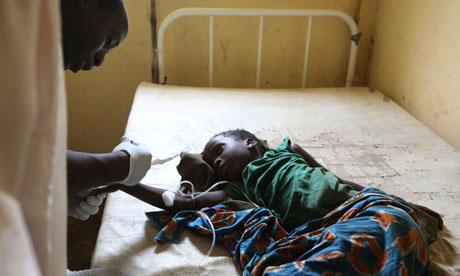
By Laura Hirahara
Impunity Watch Reporter, Africa
LAGOS, Nigeria – In Nigeria, a country that earns billions as one of Africa’s biggest oil exporters, half the country, approximately seventy-five million, lack access to clean water and proper sanitation facilities or services. In the country’s rural population, two-thirds of Nigerians do not have access to clean water. When rains are heavy and flooding occurs, which happened this year, raw sewage drains down hill in the villages, contaminating ground well water sources. Nigeria’s rural populations also suffer from poorly staffed hospitals and clinics. All of these factors have contributed to a recent cholera outbreak that has spread to several Nigerian states and into bordering countries.
Since January of this year, 1,555 people have died in Nigeria from cholera out of over 38,000 reported cases. Women and children account for about eighty percent of these deaths. Paula Fedeski, spokeswoman for UNICEF in Nigeria, told Reuters, “The rains this year have been very severe . . . [The cholera outbreak] is considerably worse this year.” UNICEF believes the outbreak originated in Nigeria and then spread to its bordering nations of Cameroon, Chad, Niger and Benin, a country of particular concern since the floods earlier this year that have contributed to the deadliness of this outbreak covered about two-thirds of Benin.
Cholera is a water born disease marked by symptoms of abdominal pain, leg cramping, severe diarrhea and vomiting. Death can occur within hours as the result of severe dehydration and shock if left untreated. Outbreaks occur when a water source becomes contaminated, usually from the feces of an infected individual. The floods this year in Nigeria and the surrounding region have only compounded the sanitation and drainage problems present throughout so much of the country.
Local officials have been working to remedy the situation. Working in their communities, officials have chlorinated water supplies including rural wells and are providing education on the causes of cholera. Many hope that this, coupled with the coming dry season, will lessen the severity of the outbreak soon. For the time being, the outbreak is being labeled as the worst since the 1991 outbreak that killed over 7,500 people in Nigeria alone.
For more information, please see;
UK Guardian- Cholera Kills More Than 1,500 in Nigeria– 26 October, 2010
The Canadian Press- Cholera Deaths in Nigeria Rise to More Tan 1,500 as Disease Threatens Flooded Benin– 25 October, 2010
CNN- Cholera Kills 1,555 in Nigera, Says U.N.– 26 October, 2010